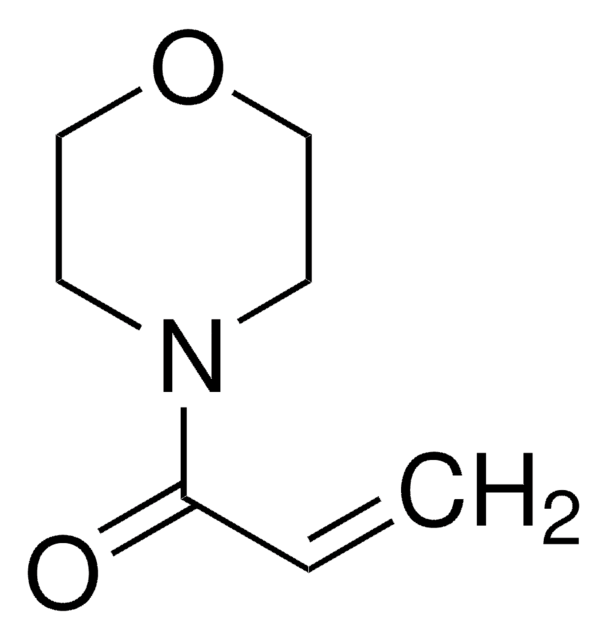655821
2-Acrylamido-2-methyl-1-propanesulfonic acid sodium salt solution
50 wt. % in H2O
Synonym(s):
2-Methyl-2-[(1-oxo-2-propenyl)amino]-1-propanesulfonic acid sodium, Sodium 2-acrylamido-2-methyl-1-propanesulfonate, Sodium acryloyldimethyltaurate
About This Item
Recommended Products
concentration
50 wt. % in H2O
refractive index
n20/D 1.4220 (lit.)
density
1.2055 g/mL at 25 °C (lit.)
SMILES string
[Na+].CC(C)(CS([O-])(=O)=O)NC(=O)C=C
InChI
1S/C7H13NO4S.Na/c1-4-6(9)8-7(2,3)5-13(10,11)12;/h4H,1,5H2,2-3H3,(H,8,9)(H,10,11,12);/q;+1/p-1
InChI key
FWFUWXVFYKCSQA-UHFFFAOYSA-M
Related Categories
General description
Application
- As a monomer in the formation of polyelectrolyte copolymer gels for potential application in bioengineering, biomedicine, and water purification .
- In the fabrication of Schottky diodes, humidity sensors, and lithium-ion batteries.
- As a monomer in the synthesis of a hydrogel nanocomposite applicable as a potential adsorbent for dyes .
Storage Class Code
10 - Combustible liquids
WGK
WGK 1
Flash Point(F)
Not applicable
Flash Point(C)
Not applicable
Certificates of Analysis (COA)
Search for Certificates of Analysis (COA) by entering the products Lot/Batch Number. Lot and Batch Numbers can be found on a product’s label following the words ‘Lot’ or ‘Batch’.
Already Own This Product?
Find documentation for the products that you have recently purchased in the Document Library.
Customers Also Viewed
Our team of scientists has experience in all areas of research including Life Science, Material Science, Chemical Synthesis, Chromatography, Analytical and many others.
Contact Technical Service


![[2-(Methacryloyloxy)ethyl]dimethyl-(3-sulfopropyl)ammonium hydroxide 95%](/deepweb/assets/sigmaaldrich/product/structures/217/219/73c91e1c-0ee4-4b3d-bead-a6dc3d09d1da/640/73c91e1c-0ee4-4b3d-bead-a6dc3d09d1da.png)
![[2-(Methacryloyloxy)ethyl]trimethylammonium chloride solution 75 wt. % in H2O](/deepweb/assets/sigmaaldrich/product/structures/316/612/66b0f4cf-d060-427d-b4f5-e8fab3e5cffe/640/66b0f4cf-d060-427d-b4f5-e8fab3e5cffe.png)





![[3-(Methacryloylamino)propyl]trimethylammonium chloride solution 50 wt. % in H2O](/deepweb/assets/sigmaaldrich/product/structures/189/736/089bc8ae-2a98-416d-9f9a-a0a510b6b828/640/089bc8ae-2a98-416d-9f9a-a0a510b6b828.png)



